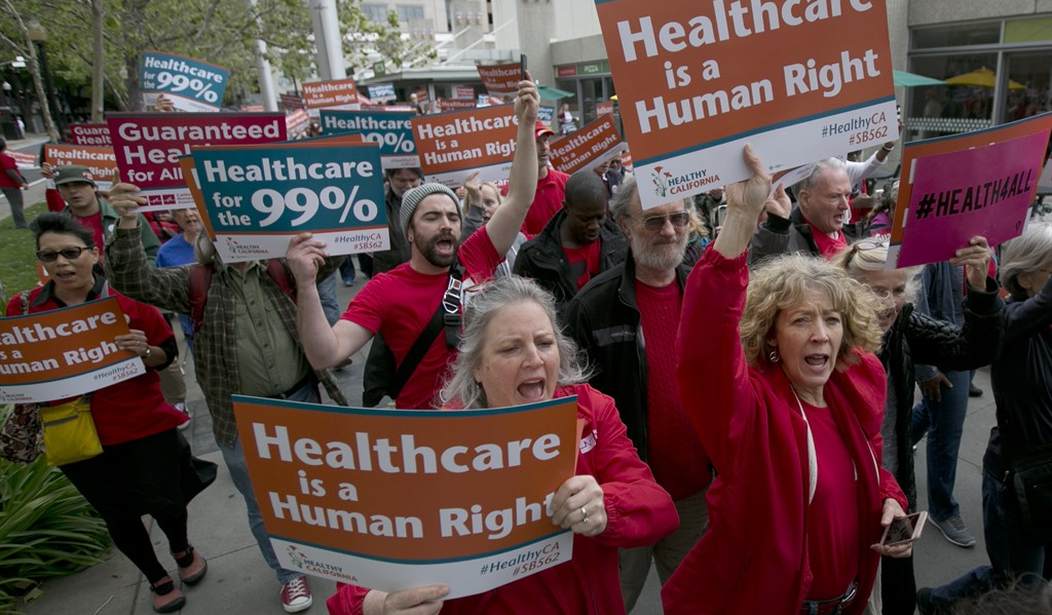We’re not all socialists yet but we’re getting there. A majority of Democrats are, in any case.
The single-payer numbers in Morning Consult’s new survey not only aren’t surprising, they’re right in line with what other studies have showed this year. For all the liberal screeching about protecting ObamaCare, the Democratic base seems perfectly willing now to move past that program — in theory, when the costs aren’t stressed too heavily. When MC asked people if they “a single payer health care system, where all Americans would get their health insurance from one government plan,” they got a split of 49/35, including 67/18 among Democrats. That makes four polls taken this year that have Democratic support in the 63-67 percent range: YouGov, Kaiser, Quinnipiac, and now Morning Consult. Other polls have also picked up the trend in growing support spotted by MC. Pew found 52 percent of Dems in favor of single-payer in June, but that was up nine points in just five months. The GOP’s run at dislodging ObamaCare combined with the problems O-Care has had in keeping premium costs down has moved the Overton window for the left. Bernie Sanders’s “Medicare for all” bill, with support from other party luminaries, will move it even further.
There are not two, not three, but probably effectively four different health-care factions on the Hill right now. There are the single-payer true believers like Bernie, the ObamaCare diehards like Nancy Pelosi, the “soft ObamaCare” preservationists in the GOP who think some reforms to O-Care are realistically the best the party can do, and the rump conservatarian types like Rand Paul and Mike Lee who still want a decentralized health-insurance system even if most Americans do not. No wonder compromise on health care is impossible, notes Ben Domenech:
The best argument in favor of the [Graham-Cassidy] proposal, even with these weaknesses, is that it will take a major step toward removing the debate about health care policy out of Washington. This is a good thing for a number of reasons, both practical and political. As a fiscal matter, it should be viewed as of a piece with Republican efforts to eliminate the state and local tax deduction: the idea is simply that if states want to tax their citizens highly to provide more generous social services, then the citizens of that state ought to pay their way and not be bailed out by other taxpayers in other states, with no representation in other states, for the cost of those social services.
You want low taxes and low social services? Move to Texas. If you want more social services and are willing to bear higher taxes? Move to New York. Obviously this logical piece of policy advice is not popular among high tax, high benefit blue states – but it has the virtue of being a more federalist solution to our current problems and it would invest far more significance in the policy decisions at the state level, where money cannot be printed at will to solve any perceived need.
Right, but tales of Medicaid rollbacks in red states and people with preexisting conditions struggling without community rating will further radicalize Democratic opinion on this, increasing calls for a “national solution.” I continue to think Peter Suderman predicted the future last month in guessing that the center of political gravity on health care will move left in short order, leaving the debate essentially between “Medicare for all” fans on the left and “hold the line” ObamaCare defenders on the center-right.
The question isn’t really where health care is headed. The question is when the national debate over a universal basic income begins. Here’s what Morning Consult got when it asked how people felt about a proposal “in which the government would provide all Americans a regular, unconditional sum of money, sometimes referred to as universal basic income.” Dude?

Overall a plurality of registered voters, 43/39, are in favor. The youngest adults split fairly decisively in support of the idea, 48/32, and a clear majority of Democrats already give thumbs up, 55/28. Most surprisingly, 34 percent of Republicans at least somewhat agree. In fact, Republican support for ideas that are anathema to fiscal conservatives is the single most interesting detail of the Morning Consult survey. A nearly identical number of GOPers, 33 percent, at least somewhat supports the idea of single-payer here. And a plurality of 47/45 supported a proposal to make four-year public colleges and universities tuition-free. A lot of Republicans want their free sh*t too. God forbid Trump figures that out.








Join the conversation as a VIP Member